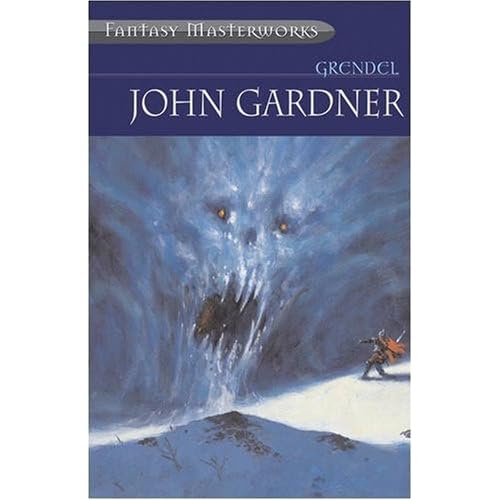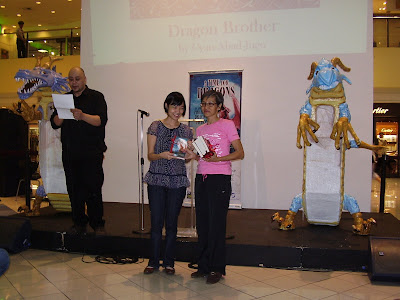Every Tuesday, I'll have an interview posted.

 Gary Turner is the publisher of Golden Gryphon Press
Gary Turner is the publisher of Golden Gryphon Press.
Hi! Thanks for agreeing to do the interview. First off, how did you first get introduced to fantasy/science-fiction/horror?
Both of my older brothers were avid readers—one had a complete set of the Edgar Rice Burroughs and similar books, the other everything that H. P. Lovecraft and pals wrote. Add to this all of the writers of the 50s and 60s, and you will see I didn’t lack for reading!
Who were some of your favorite authors or what are some of your favorite books?
Bar none, my favorite was The Lord of the Rings trilogy. Jack Vance and Lovecraft were also favorites, plus many authors from the Golden Age of SF.
How active were you with Golden Gryphon Press when Jim originally founded the company?
My brother Jim did everything, we just talked about what he was doing. He took great pride in what he did, and loved to show me the cover art. Also, for over twenty years he would give me either the galley proofs or finished books, to try to find an error. It was a running game with us, and we probably hold the world’s record on discussing whether or not a comma was needed. After his passing, I found out that there were areas that we had not covered, so the first year was a huge learning experience for me. Actually, I’m still learning more about editing and publishing on almost a daily basis.
Why the name Golden Gryphon?
A decade before its birth, Jim had decided on the name; I asked why, and Jim answered that there was no special significance, he just liked the name.
Did you ever imagine yourself running a publishing company?
No, never! While Jim was alive he was the one and only. When his days grew short, he asked two things of me: to finish any outstanding books and to take care of his dogs. The books actually made the deadlines, and the dogs still sleep in my bedroom.
Was it a difficult decision when you and your wife Geri decided to take over the operations of Golden Gryphon?
Yes, indeed. At first, I just could not imagine continuing the press without Jim; it was his baby and his legacy. I was encouraged to continue, and I feel that while Jim would have done a better job, I’ve done my best, which is all one can ask.
I love short stories and I'm glad you're printing collections. What's the appeal of short stories for you and why is that the press's primary focus, at least in the beginning?
Short stories have also been my favorite read, regardless of genre, so it’s natural that I prefer publishing such. The anthology market is crowded, so I focus on the niche of single-author collections.
Lately you've been branching out to other types of books such as reprint of novels. What other areas do you hope to explore in the future?
Given that sales are typically better for original novels, we’ll be seeing more of these in the future. I’ll still be publishing story collections, but I probably won’t be publishing any reprints in the near future, aside from reprints of Golden Gryphon hardcovers.
My first copy of your book was Jeffrey Ford's The Fantasy Writer's Assistant and Other Stories. Production-wise, it was excellent, from the cover to the binding to the paper stock. You mention in your About Page that a meal begins with the eyes. What made you decide to focus on such aspects of publishing?
A book, first and foremost, is based on the writing, where the true pleasure lies. However, the appearance of the book should also be good, as its construction. A poor cover and a book with pages falling out certainly does not add to the reading pleasure! We spend a great deal of money for each book to ensure that the art and design are great, and that the books, with their sewn bindings and alkaline paper, will be pristine for decades.
Are you an artist yourself?
No, but I spend a lot of time appreciating art, especially book cover art.
How do you decide which author to take on or to publish?
This is perhaps my hardest job, since there are so many authors out there with great material. I receive, on average, about one inquiry per day, and there are writers that I contact to see if they wish to publish with Golden Gryphon. Out of these literally hundreds of potential books, I have to pick three to eight each year. And then tell hundreds of others that I’ll have to pass on their book.
There are several factors in deciding which book to pick. Firstly, it has to be something I enjoy reading. Secondly, it has to be a book I can market; I get inquiries for young adult books all the time, but I really don’t sell to that market. Finally, it has to be a book that I feel I can at least break even, or nearly so, on. No profit, no press.
How about deciding which artist or graphic designer is appropriate for a book?
I discuss this with the author, and we decide which artist to use. In general, Golden Gryphon only uses a few artists, but when you are talking about Bob Eggleton, Thomas Canty, and John Picacio (and others), you are talking about the cream of the crop. I’ve always appreciated and been awed at their support of small presses.
What are some of the challenges in running the company? What's the biggest hurdle you're currently facing?
Selling enough books to continue publishing is always a challenge, especially given the high costs of the manufacturing. The market tends to change over time, as we’re now seeing e-books becoming more and more popular, and I have to adapt to the new reality.
It's almost a decade since you've been running Golden Gryphon Press. What's one of the most important lessons you've learned and if there's anything you'd do differently, what would it be?
Continuing the above response, I think a greater focus on marketing would have been the only thing I would change, had I a time machine. But see more about this in the next response.
It's my experience that Golden Gryphon Press is mostly successful due to word of mouth praise. Is there an extensive marketing/promotions plan for the company or is this the perfect equilibrium for the business?
Golden Gryphon is limited in the amount of money available to market books, and that has always been a weakness. Sending an author on a signing tour is more than I could begin to afford, and print ads, which we do from time to time, also tend to bust the budget. I try to attend meetings and I encourage authors to do so also, and to arrange signings at their local bookstores. I also maintain a list of clients and send out postcards and e-mail messages about new books and other general interest items.
In your opinion, who's your target demographic of your books?
It’s hard to say, as I meet very few of the people that buy our books. I believe that the largest segment is those that are fans of a given author, and want their latest collection or novel. There are also the book collectors who buy every book, in order to have a complete set of Golden Gryphon books. I can’t argue with the latter, as I’ve done the same.
What are some of your projects in 2009?
Here is a preview for 2009:
April: Trade paperback editions of
The Fantasy Writer’s Assistant and
The Empire of Ice Cream, both by Jeffrey Ford. The hardcover editions are out-of-print for the former, and almost so for the latter.
May: Hardcover edition of
Empties by George Zebrowski. A novel that’s part SF, part horror, part noir and part mystery, where a detective has to solve an impossible crime.
September: Hardcover edition of
Dreamwish Beasts and Snarks by Mike Resnick. All of his space-safari stories in one collection.
October: Hardcover edition of
Are You There by relatively new author Jack Skillingstead. His first story was published in 2003, you’ll want to see why they are already being collected. A new, fresh, weird voice.
As I say in our website, we try to publish today’s masters and tomorrow’s rising stars.
How about advice for aspiring writers?
Nothing will turn an editor or publisher off faster than a poor presentation or poor writing. Do your homework before you contact a publisher. Make sure that your book will fit in with the publisher (I get a few recipe book inquiries each year!), see if they have submission guidelines, and proofread your inquiry letter very, very carefully. Poor usage and style in the introduction letter simply lowers the chance of consideration. Getting an agent is extremely important, as some publishers will only consider projects from agents, or so I’ve heard. Most importantly, in your introduction letter, give the reader a unique reason to consider your book; why is this book going to be better than the thousands of others published each year? Finally, keep your introduction letter short. No one reads much past the first paragraph unless they’ve been hooked.
Even if you have the hottest book since Harry Potter, expect rejection letters, or no reply at all. I know two professional authors (that is, they write full time and make their living from writing) that have hundreds of rejection letters—if one can be believed, over a thousand. Getting rejected hundreds of times didn’t stop them; they tried to learn what they were doing wrong, and used rejection as a learning experience.






























